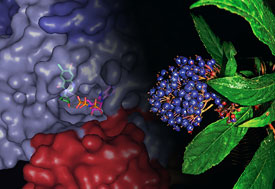Mysterious Chinese Chang Shan herb holds promise for malaria, cancer
January / February 2013 | Volume 12, Issue 1

Photo by Paul Schimmel/The Scripps Research Institute
Scientists have recently discovered exactly how
Chang Shan, a traditional Chinese herbal medicine,
works against malaria.
Scientists have recently discovered exactly how a traditional Chinese herbal medicine works against malaria. The Chang Shan herb - which has been used for thousands of years - contains a compound that binds to an enzyme in the malaria parasite, blocking it from producing a protein needed for survival.
Dr. Paul R. Schimmel and his team at The Scripps Research Institute conducted a series of molecular studies and deciphered a high-resolution chemical structure that reveals how the compound jams the process of aminoacylation, a crucial biological process that allows organisms to synthesize the proteins they require to live.
The findings, reported in a recent issue of the journal Nature, may drive the development of further drugs to treat malaria and compounds to combat other conditions, such as autoimmune disorders and melanoma, the authors suggest.
The study was supported by the NIH's National Institute of General Medical Sciences (NIGMS) and by a fellowship from the National Foundation for Cancer Research.
More Information
To view Adobe PDF files,
download current, free accessible plug-ins from Adobe's website.